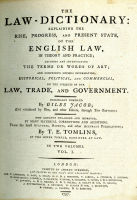 The edition of Jacob's Law Dictionary that we hold in the History Centre was published in 1782, but Giles Jacob first published his Lex constitutionis in 1719. It was (and is) a thorough and painstakingly precise compendium of statute, common and criminal law and, although eventually replaced by other similar texts, it was always well regarded throughout the 18th and 19th centuries.
The edition of Jacob's Law Dictionary that we hold in the History Centre was published in 1782, but Giles Jacob first published his Lex constitutionis in 1719. It was (and is) a thorough and painstakingly precise compendium of statute, common and criminal law and, although eventually replaced by other similar texts, it was always well regarded throughout the 18th and 19th centuries.
Giles Jacob (1686 – 1744) was born in Romsey in Hampshire, the son of a brewer. While his early life is not very well documented, we do know that he trained at the law and at some stage became a secretary to Sir William Blathwayt, who established the War Office. He seems to have worked in litigation, probably mainly in the manorial courts. He wrote his first book, 'The Compleat Court-Keeper', on the subject of estate administration in 1713 which proved very successful.
It would be tempting to think of Jacob as a dry, legal obsessive but he had a great interest in contemporary poetry and literature and wrote a farce in 1714 - 'Love in a Wood or The Country Squire', which was never produced - and later wrote a satire of Alexander Pope's 'The Rape of the Lock' called 'The Rape of the Smock'. The poem was bawdy in the extreme and the following year led to further publications of similarly bawdy works. Pope would later lampoon Jacob (the two individuals seem to have enjoyed a healthy dislike of one another) in his work the 'Dunciad' of 1728 as
"Jacob, the scourge of grammar, mark with awe,
Nor less revere the blunderbuss of law."
Jacob enjoyed considerable commercial success with his Dictionary and several other works produced for the litigation student and legal profession. He married late in life (1733) and had at least one child. By 1736 he moved out of London to Staines in Middlesex, but died on 8 May 1744.
So what does Jacob's Dictionary contribute to research today? While it is not the easiest text on the eye, it does provide a wonderful tool for any local, family or social historian since it contains contemporary definitions for (now) often archaic terms. Among many other definitions, it explains in detail the laws of copyhold, capital crimes, laws of libel and indecency, statutes behind the indenting of apprentices, and lots more. Anyone who has struggled with reading and analysing deeds, legal documents, court rolls, indentures, etc, will find this dictionary a godsend since it places many useful examples of words and phrases in context, something which is crucial for anyone studying 17th and 18th century legal documents.
So if you are struggling to decipher a legal document, or need to know exactly what constituted a capital crime and why, have a look at Jacob's Law Dictionary and discover a wonderful key to 18th century legal history.


